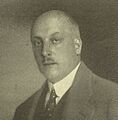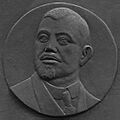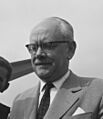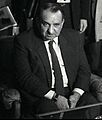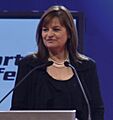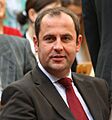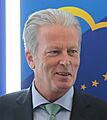Vice-Chancellor of Austria facts for kids
Quick facts for kids Vice-Chancellor of the Republic of Austria |
|
|---|---|

|
|

|
|
| Executive branch of the Government of Austria | |
| Style | Mr Vice-Chancellor (informal) His Excellency (diplomatic) |
| Member of | Cabinet |
| Seat | Vienna |
| Nominator | Chancellor of Austria |
| Appointer | President of Austria |
| Constituting instrument | Constitution of Austria |
| Formation | 15 March 1919 |
| First holder | Jodok Fink |
The Vice-Chancellor of Austria is an important member of the Government of Austria. Think of them as the main helper or "deputy" to the Chancellor. In many other countries with similar government systems, this role is called a deputy prime minister.
What Does a Vice-Chancellor Do?
The job of the Vice-Chancellor is clearly explained in Austria's main rulebook, the Constitution of Austria. It says that the Vice-Chancellor steps in and takes over all the duties of the Chancellor if the Chancellor is unable to do their job. If both the Chancellor and Vice-Chancellor are unavailable, the President chooses another government member to fill in.
Usually, the Vice-Chancellor is a top leader from the smaller party in a coalition government. A coalition government is when two or more political parties work together to form the government. Sometimes, if only one party is in charge, the Vice-Chancellor might be the person expected to become Chancellor next.
History of the Vice-Chancellors
The role of Vice-Chancellor in Austria began in 1919. Many different people have held this important position over the years, helping to lead the country.
Austria was taken over by Nazi Germany in 1938. This period is known as the Anschluss. Austria became independent again in 1945 after World War II.
Since 1945, many Vice-Chancellors have served Austria, helping to rebuild and guide the nation through different times. The current Vice-Chancellor is Werner Kogler, who started his term on January 7, 2020.
Images for kids
See also
 In Spanish: Anexo:Vicecanciller de Austria para niños
In Spanish: Anexo:Vicecanciller de Austria para niños
 | Selma Burke |
 | Pauline Powell Burns |
 | Frederick J. Brown |
 | Robert Blackburn |





